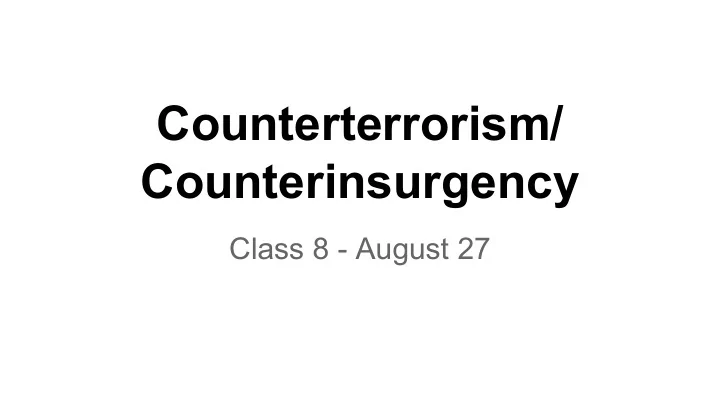

Counterterrorism/ Counterinsurgency Class 8 - August 27
How can governments stop insurgents or terrorists?
How can governments stop insurgents or terrorists? ● Use force ○ Punitive military tactics ○ Repression ○ Police measures ● Negotiate with some, use force on others. ○ Work with moderates to punish extremists ○ Resolve financial grievances. Each tactic has benefits and drawbacks.
Military tactics ● Military action against insurgents/ terrorist sanctuaries. ● Drone strikes and special forces assassinations against suspected terrorists.
Repression ● Prevent organization by restricting social rights. ● Suspension of habeas corpus, censorship, detention without cause or prosecution, guilt by association, torture.
Police measures ● Preventive, especially for terrorist attacks. ● Wiretapping, body scanners, urban surveillance, sting operations, NSA, etc.
Drawbacks?
Drawbacks? ● May be effective in short term, but creates more support for violence in long-term. ● May play into terrorists’ hands. ● Creates backlash, especially in democracies.
Some Concessions: Kydd and Walter ● What case do they look at?
Some Concessions: Kydd and Walter ● What case do they look at? ○ Israel and Palestine: ○ Negotiations between Israel and PLO with Hamas as spoiler. ○ Extremists will disrupt negotiations to obtain their ideal point. ○ Only effective if moderates seen as strong and trustworthy a priori .
Terrorism upends trust in strong moderates ● Weak moderates are not expected to do much, as it is (PLO 1994) ● Strong moderates that fail to stop attacks will lead to a loss of faith in negotiation (1996, 2001). ○ Moderates are seen as exploiting good will of population (Israel) through negotiations and simultaneously backing terrorism.
Policy Implication?
Policy Implication? Governments must negotiate with credible moderates. Moderates should be responsible for reeling in extremists to maintain trust...or just pay the extremists off.
Another example: Sons of Iraq ● US pays Sunni tribesmen in Iraq to oppose Al-Qaeda in Iraq insurgents. ● Problem: Group falls apart after US withdrawal.
Concession 2: Resolve Grievances ● Berman et al. 2011 ● Financial transfers can make people less likely to support violence. ● How is this measured? ● Any issues with findings?
Concession Drawbacks
Concession Drawbacks ● Moderates can lose to extremists. ○ Ex. ISIS destroys Sons of Iraq ● Insurgents might not want financial transfers.
Discussion: What sounds like the best approach to dealing with insurgency? Terrorism? Is any one approach best? Should a combination be used? Can military occupations successfully reduce violence?
Afghanistan and Chechnya Cases
Afghanistan: Background ● Multi-ethnic, traditionally decentralized. ● War, foreign occupation since 1979. ● Taliban rule 1996-2001 ● US invades in 2001.
US empowers Northern Alliance ● Mostly Uzbek, Tajik and Northern Pashtun- supported. ● Taliban return in 2004 as fighting force. ● Obama introduces ‘Afghan Surge’ in 2009.
U.S. Tactics used to subdue Taliban
U.S. Tactics used to subdue Taliban ● Training local security forces. ● Attempting to convince locals to support Afghan government and not Taliban.
Problems U.S. encountered...
What, if anything, can the US do to end Taliban insurgency?
Chechnya...you know the story, right?
What were Russian tactics during first Chechen War?
What were Russian tactics during first Chechen War? ● Conventional, designed as show of force. ● Chechens designed for war of attrition, create low morale among Russian troops. ● What was the effect?
What were Russian tactics during the Second Chechen war?
What were Russian tactics during the Second Chechen war? ● Morale training for troops before conflict. ● Radical Chechen fighters mobilized support. ● Increased radicalization through targeting of civilians. ● Swayed secular moderates to join government and fight insurgents. ● Insurgents dispersed to neighboring regions.
Could Russia have done better in prosecuting Chechen War(s)? Should war have been fought in the first place?
Recommend
More recommend